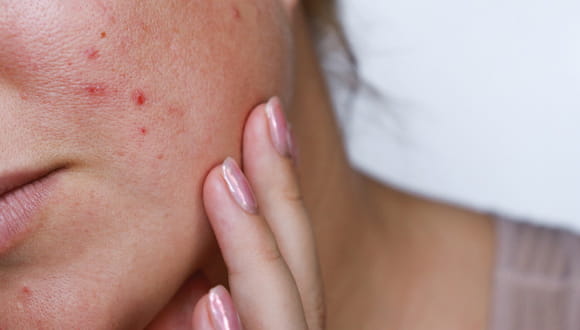Pregnancy Acne: Why It Happens & How to Get Rid of It
Oct. 19, 2023 - Katie McCallumPregnancy comes with all sorts of uncomfortable and inconvenient bodily changes. There's the weight gain of course, but there's also the nausea, heartburn, food aversions and cravings, sciatica, swollen feet — all part of a nowhere-close-to-comprehensive list of what to expect when you're expecting.
And what's this? Now you're dealing with acne, too?
A quick Google search and you might stumble upon the superstitious notion that experiencing acne during pregnancy is a sign you're having a girl.
Pregnancy acne — yes, there's an actual term for it — can't predict the sex of your baby, of course, though there is a blood test for that. But that probably wasn't the question you most need answered anyway.
When it comes to the annoying resurgence of breakouts that can happen while pregnant, you're likely more concerned with how long you should expect to deal with it and, maybe most importantly, how to clear pregnancy acne without harming your baby's health?
Dr. Traci DeSplinter, an OB-GYN at Houston Methodist, is here to answer these questions and more.
Why does pregnancy acne happen?
Not many people can say they escaped their teens without embarrassing flare-ups of pimples. Pregnancy breakouts aren't as common, but according to a 2014 study, more than 40% of expectant woman have to deal with acne.
"The culprit is the hormonal changes that occur during pregnancy," explains Dr. DeSplinter. "These changes can cause oil glands in the skin to become more active, which leads to exacerbation of acne."
In other words, pregnancy acne isn't really any different than what you dealt with as a teenager, when your hormone levels were fluctuating due to puberty.
When does pregnancy acne start?
Perhaps you've heard that acne can be an early sign of pregnancy. While it's certainly not among the most common indicators — those include missing a period, fatigue, frequent urination and tender, swollen breasts — acne might be one of those subtle tip-offs.
But even though acne can begin early during pregnancy for some women, Dr. DeSplinter points out that breakouts can happen any time during pregnancy. And the first trimester isn't the most common time for them.
"Pregnancy acne is often most pronounced during the third trimester," says Dr. DeSplinter. "This is when the activity of the skin's sebaceous glands is at its highest."
When does pregnancy acne go away?
Finally, some good news: Pregnancy acne isn't forever.
"It clears up after childbirth, typically resolving a few weeks after delivery," says Dr. DeSplinter.
In the meantime, Dr. DeSplinter has tips for safely dealing with pregnancy acne.
Pregnancy acne treatment: Which medications are safe and which aren't?
Not all medications are safe to take when you're pregnant. That's why it's important to talk to your doctor about the medications you already take, as well as any medication you consider taking while pregnant.
As for pregnancy-safe acne treatments, Dr. DeSplinter says that most over-the-counter topical acne medications are safe, including ones containing benzoyl peroxide and adapalene.
Still, it's always best to consult your doctor before taking a new over-the-counter medication, especially during pregnancy.
Certain topical and oral antibiotics that can help with more severe acne are also safe during pregnancy, though these will need to be prescribed by your doctor.
The acne treatments that aren't safe during pregnancy and should absolutely be avoided include:
- Tretinoin
- Salicylic acid
- Doxycycline
"These medications can cause problems for the fetus," says Dr. DeSplinter. "If you're struggling with acne, consult your doctor. He or she can recommend the acne treatment options that are safe for your growing baby."








